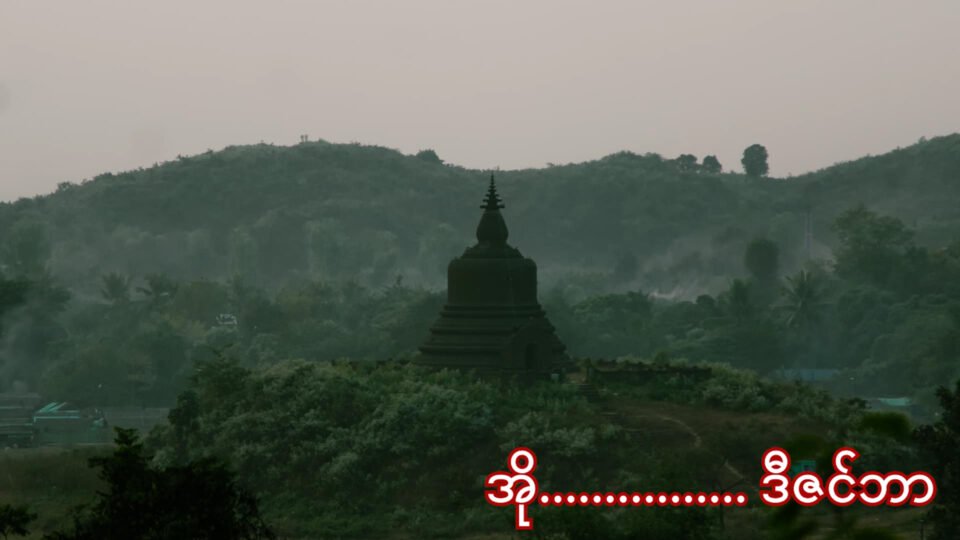The essence of December’s cold grew increasingly tangible. On the towering mountains and steep cliffs of Nwal Chyo Phoe Khaung, a variety of Thazin and orchid blossoms adorned the land with their vitality.
The four major rivers, minor rivers, streams, forests, mountain ranges, fields, farmlands, and the echoes of ocean waves all contributed to the structure of the Arakan nation. Amidst these natural treasures stood the majestic Golden Palace of Mrauk U, gracing the hills, ridges, moats, and mighty walls with its grandeur. It remained dignified and noble with December’s coolness.
However, this sense of calm dissipated in the winter of December 1146. It became a sea of grief for the Arakanese people, who suffered the loss of lives and wealth. Along with this fateful winter, the people of Arakan were reduced to a fragmented existence, likened to the scattered pieces of a broken bamboo raft. Arakan’s sovereignty and royalty were extinguished. In the wake of that December, Ramree (Ramawati) fell under enemy control, and the mighty Toungup (Tanlwe) fortress has fallen.
The people of Arakan fled the enemy’s grip in every conceivable way, crossing the Bay of Bengal on large and small boats. They braved the bone-chilling winter on perilous sea journeys, blind to the horizon and shore.
The first undocumented boat refugees of the 18th century were none other than the Arakanese. Ten thousand warriors from Thandwe surrendered their weapons to the enemy. A country weakened in spirit and governance was left vulnerable. The future of the nation loomed dark, haunted by the ominous shadows of a dreadful past.
The monumental mistake that began that winter extended its consequences for over two centuries. From that fateful winter, the Golden Palace of Mrauk U and the sacred Buddha relics of the Arakanese fell under enemy hands.
The king, queen, princes, and princesses were taken away under the directives of the Burmese King. Renowned scholars, skilled soldiers, and intellectuals became subjugated prisoners of the enemy. The people of Arakan were subjected to forced labour, executions, and atrocities. The massive pagodas and stupas deteriorated, covered in moss, without patrons to maintain them.
The peace and serenity of December became a fiery storm of grief for the Arakanese. For them, December was a month drenched in sorrow and desolation, its skies eternally shrouded in metaphorical ashes of despair. Under the ruthless rule of Mayor Nandapakyan, the Arakanese elders endured immense suffering.
Disunity and the lack of solidarity culminated in the enslavement of the people. Sovereignty shattered, and the Arakanese became bound to the chains of servitude. The disunity manifested as different rulers—Dhamma Naing Min, Kala Shwe Sa Min, Kaung Nyunt Yan Taing Min, Than Htwe Min, Kyaw Htwe Min, and Tha Doe Phyu Min—dividing and ruling parts of Arakan. They were disloyal to the king. The people suffered the consequences of such disunity and the lack of solidarity.
Senior monks with many years of monastic age and service were forced to disrobe and then made to reorder under junior monks. Literature, culture, and music disappeared. Such frightening feudal grudges fell upon the Arakanese.
However, the Arakanese continuously fought back against enemy troops. Among these heroes, Colonel Chin Pyan (Chin Pyan) was the most famous.
From the day Mrauk U fell, the dreams of the Arakanese turned into wistful longing, distant and unreachable.
The December winter when our ancestors suffered an ocean of sorrow over 200 years ago is no longer the same as this December winter of 2024.
Today, the Arakan Army is pushing back against the enemy military dictators’ armed oppression. From Paletwa in Chin State to the Ann military headquarters, the brave Arakanese soldiers have penetrated deep into enemy territory. Like an unerring arrow, the Wolf Warriors strike at enemy targets with courage and precision, securing resounding victories.
This winter, these frost particles are no longer like the bad omens of over 200 years ago for the Arakanese. This month, this time, this December is not the hopeless December that our ancestors faced in the past. Breaking through December’s mist and frost particles, the amazing wingbeats of the young warriors echo between the Bay of Bengal and the Arakan mountain range.
The bitter lessons of the feudal era’s disunity and division have become a foundation for building a united and progressive Arakan. The Arakan Army, in solidarity with other oppressed ethnic groups, continues to counteract the brutality, oppression, and decapitation tactics of the enemy.
The enemy’s underestimation has become an opportunity for greater Arakanese unity. This opportunity has led to increased love, respect, and support between the Arakanese people and the Arakan Army.
The Arakan dream that our ancestors dreamed in December over 200 years ago has become more tangible this December.
The past cannot be forgotten. However, when compared with present circumstances… A country fell during the cold December over 200 years ago.
Now in modern December 2024, during the cold time, only a little remains before reclaiming a country from enemy hands. Though this December is said to be bone-chillingly cold, it should be called a December warmed by the dawn lights of a new nation or country with liberation, justice, love, unity, loyalty, and peace.
